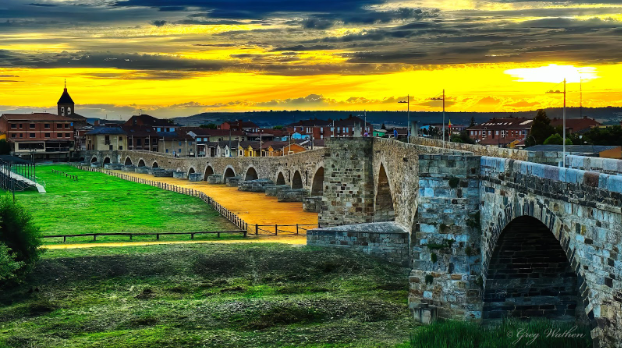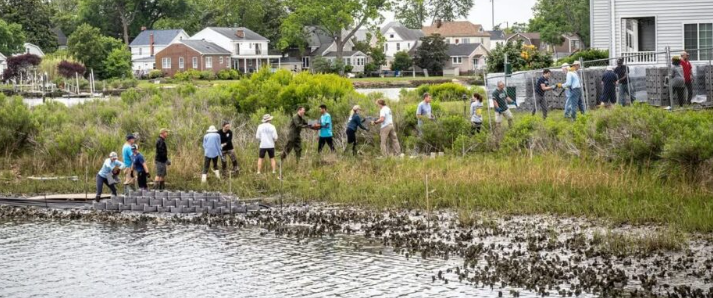The following guest blog is written by Greg Wathen. You can read this blog and many more on his blog, Wathen’s Photo Travels.
On June 16, 2015, I walked into the Cathedral of Saint James in Santiago de Compostela, Spain, to complete my Camino de Santiago pilgrimage. I had been on pilgrimage for 5 weeks, trekking for nearly 500 miles along the Camino route known as the French Way, starting in St. Jean Pied du Port, France, and traversing across northern Spain to Santiago. Two days later, Pope Francis’ encyclical, Laudato Si’: On Care for Our Common Home, was officially published. The simultaneous nature of the two events, my arrival in Santiago and the Vatican’s release of Laudato Si’, was not planned for on my part, but the serendipity of their timing was not lost on me.
While I was on pilgrimage in 2015, I had the opportunity to spend much time in prayer and in conversation with other pilgrims. My stated purpose for making the pilgrimage was to “listen to the voice of God,” and the Camino provided the necessary time and space for such listening and reflection. As I walked, I reflected on my life, my family and friends, and my career as a wildlife conservationist. At 58 years of age, I was beginning to think about priorities for the end of my working career and what I should be doing in retirement — as I said, there was plenty of time and space to consider these questions of life. While on pilgrimage, I was also aware that Pope Francis was working on a papal document on the environment, and I was eager for its release. I wanted to know what Pope Francis thought about the current state of the world’s environmental issues, and to learn more about the Catholic Church’s teachings and views on protecting the environment, and how humanity should care for God’s creation.
Laudato Si’: On Care for Our Common Home is, to my thinking, one of the seminal documents of the 21st century. And I fervently hope that it will continue to be viewed as such when the 21st century is finished. Laudato Si’ is in essence a letter to the world, and reflects a comprehensive perspective on humanity’s relationship to God’s creation, recognizing all creation as a gift from God, and recognizing humans as inherently connected to creation and to each other. Laudato Si’ also recognizes the environmental damage that is occurring to our Common Home, from a variety of causes, resulting in overexploitation of natural resources, unsustainable burning of fossil fuels, disruption of natural processes, and destruction of landscapes and natural resources. But Laudato Si’ goes even further, calling attention to what it calls the “technocratic paradigm”, a system that is concentrating wealth and power into the hands of a few individuals, while exploiting people all over the globe, depriving them of dignity and the ability to live their lives as God intended, as people of God.
In the 10 years since Laudato Si’ was presented to the world, I continue to be guided by its teachings. It has helped me renew my commitment to environmental protection, and to re-purpose my conservation efforts as I have transitioned from my professional life into a role as a retired conservationist. Perhaps more importantly, Laudato Si’ has given me a pathway to integrate my conservation interests into my Catholic faith. I have become involved in various faith-based groups to advocate for care for creation ideas, such as Catholic Climate Covenant and Tennessee Interfaith Power & Light. I have helped teach classes on Laudato Si’, both to youth and adults, and I helped to record a series of podcasts on Laudato Si’ for Nashville Catholic Radio.
I also help with the Faithful Citizenship ministry at our local parish, St. Stephen Catholic Community, in Old Hickory, Tennessee. We planted a pollinator garden on our parish campus, dedicating it to Saint Kateri Tekakwitha. We continue to explore new ways to integrate the teachings of Laudato Si’ into our lives, both at the individual level as well as in community. One concrete example is our work to live more sustainably through our food choices. We help with food distribution to those who are food insecure, and we’re looking for ways to improve both food security within our communities and through supporting our local farmers who can provide nutritious food products more sustainably.
As the world moves into the next 10 years of Laudato Si’, I recognize that the first 10 years have seen both amazing progress and disappointing setbacks. This reminds me so much of the Camino pilgrimage in which pilgrims experience both positive progress and challenging setbacks. As a pilgrim, we learn to expect both progress and challenges. We learn to be grateful for the many blessings of the Camino; indeed, we are thankful just for the opportunity to be on pilgrimage, and we learn to take the setbacks in stride. And so, we continue to move forward one step at a time, with a grateful heart and steadfast purpose, and above all with hope.
In closing, during this Jubilee Pilgrimage of Hope, let us pray for continued commitment to caring for Our Common Home. In the words of the USCCB’s Letter to Young People for the 10th Anniversary of Laudato Si’, “we call for the Church to be a radiant sign of hope, praising God through a renewed commitment to care for our common home, which sustains all life.”
Greg Wathen is a retired wildlife biologist who enjoys photography, fishing, traveling, gardening, and almost any kind of outdoor activity. He especially enjoys landscape photography, and cares deeply for our planet. He is working hard to ensure that we protect planet Earth through careful stewardship and conservation of all creation. He is a member of Saint Stephen Catholic Community in Old Hickory, Tennessee and is involved in the Faithful Citizenship ministry at St. Stephen, which focuses on Catholic Social Teachings, including Care for Creation. You can read more on his blog.


